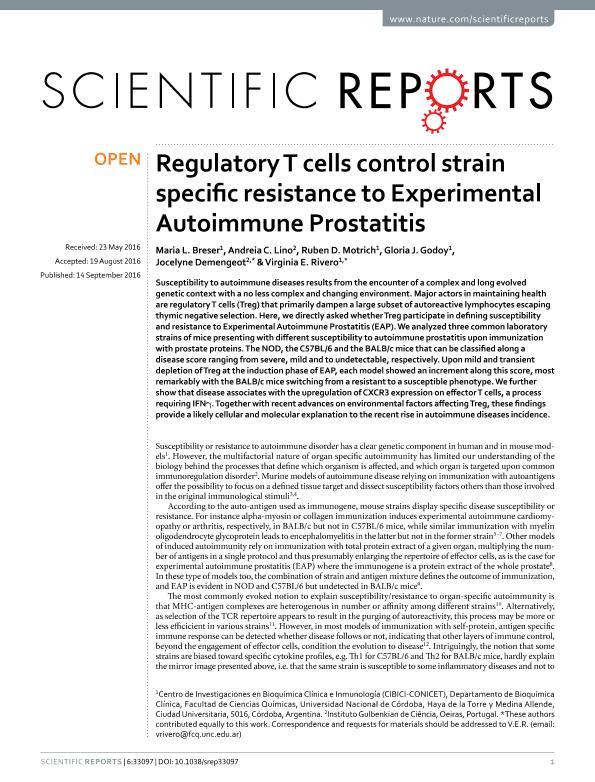Artículo
Regulatory T cells control strain specific resistance to experimental autoimmune prostatitis
Breser, Maria Laura ; Lino, Andreia C.; Motrich, Ruben Dario
; Lino, Andreia C.; Motrich, Ruben Dario ; Godoy, Gloria Janet
; Godoy, Gloria Janet ; Demengeot, Jocelyne; Rivero, Virginia Elena
; Demengeot, Jocelyne; Rivero, Virginia Elena
 ; Lino, Andreia C.; Motrich, Ruben Dario
; Lino, Andreia C.; Motrich, Ruben Dario ; Godoy, Gloria Janet
; Godoy, Gloria Janet ; Demengeot, Jocelyne; Rivero, Virginia Elena
; Demengeot, Jocelyne; Rivero, Virginia Elena
Fecha de publicación:
09/2016
Editorial:
Nature Publishing Group
Revista:
Scientific Reports
ISSN:
2045-2322
e-ISSN:
2045-2322
Idioma:
Inglés
Tipo de recurso:
Artículo publicado
Clasificación temática:
Resumen
Susceptibility to autoimmune diseases results from the encounter of a complex and long evolved genetic context with a no less complex and changing environment. Major actors in maintaining health are regulatory T cells (Treg) that primarily dampen a large subset of autoreactive lymphocytes escaping thymic negative selection. Here, we directly asked whether Treg participate in defining susceptibility and resistance to Experimental Autoimmune Prostatitis (EAP). We analyzed three common laboratory strains of mice presenting with different susceptibility to autoimmune prostatitis upon immunization with prostate proteins. The NOD, the C57BL/6 and the BALB/c mice that can be classified along a disease score ranging from severe, mild and to undetectable, respectively. Upon mild and transient depletion of Treg at the induction phase of EAP, each model showed an increment along this score, most remarkably with the BALB/c mice switching from a resistant to a susceptible phenotype. We further show that disease associates with the upregulation of CXCR3 expression on effector T cells, a process requiring IFNγ. Together with recent advances on environmental factors affecting Treg, these findings provide a likely cellular and molecular explanation to the recent rise in autoimmune diseases incidence.
Palabras clave:
Prostatitis
,
Autoimmunity
,
Th1
,
Treg
Archivos asociados
Licencia
Identificadores
Colecciones
Articulos(CCT - CORDOBA)
Articulos de CTRO.CIENTIFICO TECNOL.CONICET - CORDOBA
Articulos de CTRO.CIENTIFICO TECNOL.CONICET - CORDOBA
Articulos(CIBICI)
Articulos de CENTRO DE INV.EN BIOQUI.CLINICA E INMUNOLOGIA
Articulos de CENTRO DE INV.EN BIOQUI.CLINICA E INMUNOLOGIA
Citación
Breser, Maria Laura; Lino, Andreia C.; Motrich, Ruben Dario; Godoy, Gloria Janet; Demengeot, Jocelyne; et al.; Regulatory T cells control strain specific resistance to experimental autoimmune prostatitis; Nature Publishing Group; Scientific Reports; 6; 9-2016; 1-12
Compartir
Altmétricas



